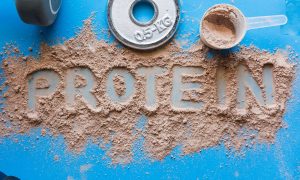Should You Have Protein Before Bed?

|
|
In order for us to benefit from optimal levels of health and fitness, experts recommend a combination of regular physical exercise and activity, and a healthy and balanced diet in the process. Eating healthily is not as simple and as straightforward as some would have us believe, because what’s true for one person, may not necessarily be true for another. For example, an endurance runner training for a marathon may consume more carbohydrates than other people, especially leading up to the race, in order to flood their muscles with glycogen energy. On the flipside, a person trying to watch their weight, I.E a competitive bodybuilder or figure athlete, will need to watch their carbohydrate consumption as too many carbs can lead to water retention and weight gain. Some people respond well to healthy fats, whilst others simply do not. One thing we can all agree on however, in general at least, is that barring medical conditions such as food allergies and intolerances etc, protein is one of the most important macronutrients we could ever wish to consume, as it serves a whole variety of different purposes. Recently there has been some debate about whether or not it’s beneficial to consume protein before bed, and if so, which sources are the best, and what purpose(s) do they serve? To help clear things up, we’ll now take a more in-depth look.
First off, what is protein?

Protein is one of the three essential macronutrients, with the other two being fats and carbohydrates, that is responsible for a whole variety of different purposes and processes within the human body. It is an essential nutrient that plays a key-role in metabolic function, in the growth and repair of muscle tissue, and in cellular health, repair, and function as a whole. Considering we’re basically comprised of billions upon billions of microscopic cells ourselves, considering protein is vital for the health and function of cells within our bodies, now you probably get an idea of exactly why it’s so beneficial. People think that protein is mainly just important for bodybuilders and people looking to increase their lean muscle mass, but in reality protein can assist in post-workout recovery, in fat metabolism, in general health and well-being, in protein synthesis, and much more besides. Recently there has been some debate about whether or not we should consume protein before going to bed, with some saying it’s essential, and others saying it’s a complete waste of time. Currently all of the evidence points to the fact that protein before bed is indeed highly beneficial, and it all comes down to a natural process known as catabolism.
Catabolism

When we consume foods, particularly foods rich in protein, our bodies enter what is known as an anabolic state, which means that they’re actually helping us to build lean muscle mass and burning body fat for energy in the process. When the body becomes starved during prolonged periods of not eating, energy reserves are quickly used up, and the body begins to panic as it enters starvation mode because it literally thinks that it is starving. It then looks for the nearest available source of energy, which is actually not body fat reserves at all because the metabolism, lacking energy, would struggle to convert the fat to energy. Instead, the body eats away at proteins and amino acids found naturally within the muscles, as well as being essential for the growth and repair of new muscle tissue. That means that not only does your body eat away at your lean muscle mass, it also uses up all of the nutrients that would have ordinarily been used to build new muscle tissue. When we sleep, although we require less energy, we still require energy and as we’re going for around 7 – 9 hours on average without food, our bodies enter a catabolic state which is extremely counter-productive. To help combat this however, experts have found that consuming protein before bed can prevent catabolism and can help keep your body in an anabolic state, which means that whilst you sleep you’re strengthening and building your muscles and are helping to burn body fat simultaneously. The next problem is identifying which sources of protein are the best. Some recommend whole foods, whilst others recommend protein powders. Here’s a quick breakdown of some of the most popular examples.
Whole foods
Typically, protein is found most commonly in meat, seafood, dairy produce, and eggs, although there are also plant-based sources, just not quite as high in protein as meat, fish, or eggs. By consuming whole food protein sources before bed, you do indeed provide protein for your body to help hold off catabolism, but the problem is that it still digests relatively quickly, so after a few hours that protein will quickly be used up, and you’ll be back to square one. Also, eating whole foods directly before bed can be uncomfortable and can cause issues such as heart burn, acid reflux, or indigestion.
Whey protein powder

Whey protein powder is the most popular sports supplement in the entire world, and it is certainly not just intended for bodybuilders or people trying to build lean muscle mass. Studies have found that whey protein powder before bed, whilst still beneficial, is not AS beneficial as when used at other times during the day. The problem with whey before bed is that it is a fast-absorbing protein, which means it gets into your system quickly, immediately gets to work, and is used up much quicker. That’s why whey protein is considered most effective when consumed immediately following a workout, because it is able to quickly make its way into the muscles and begin the post-workout recovery and repair process. If whey protein is your only option, mixing it with milk will slow down the absorption rate, but it certainly won’t keep you going all night.
Casein protein
For protein immediately before bed, there really is only one true protein source and that source is casein protein. Casein protein is a slow-digesting, slow absorbing protein that takes hours upon hours to be fully digested and broken down. That means that it gradually releases a steady stream of protein and amino acids into the body as you sleep, which helps keep your body in an anabolic state and helps to prevent catabolism. When it comes to protein directly before bed, casein protein is the ideal protein for you.














